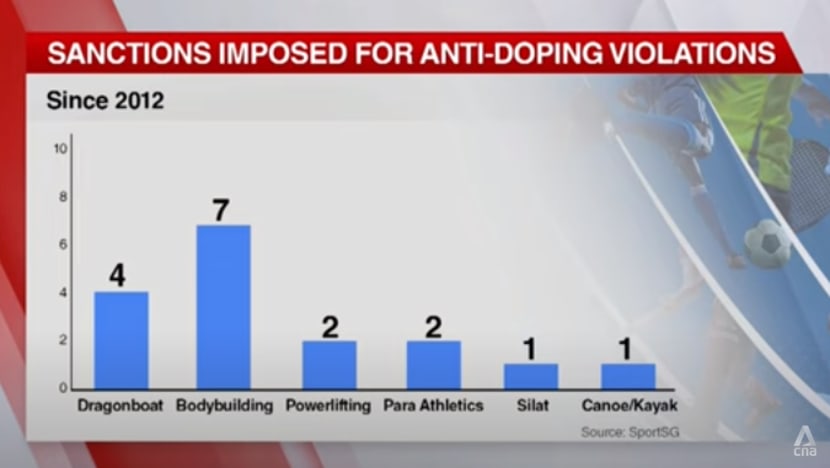National swimmers’ drug scandal is a timely call for better education: Anti-Doping Singapore
The national anti-doping authority said it will be prioritising education on clean sport and promoting doping-free behaviour among the local sport fraternity.

SINGAPORE: The national anti-doping authority said that the recent drug scandal involving Singapore’s national swimmers is a timely call to better educate athletes.
“This incident is quite timely, because there is now a global push on education to the forefront of the anti-doping strategies,” said Dr Patrick Goh, chairman of the National Anti-Doping Advisory Board.
“It also showed the need for athletes, even at that level, to be better educated and understand their responsibilities,” added Dr Goh, who is also the chairman of the Southeast Asia Regional Anti-Doping Organisation.
PRIORITISING EDUCATION
Anti-Doping Singapore (ADS) said it will be prioritising education on clean sport and drug awareness, and promoting doping-free behaviour among the local sport fraternity.
Athletes and support personnel can expect more frequent and informative education programmes and workshops.
This comes after Singapore's national swimmers Joseph Schooling, Amanda Lim and Teong Tzen Wei confessed to consuming recreational controlled drugs overseas last year.
The three tested negative for banned substances, and were not sanctioned as the consumption of some recreational controlled drugs outside of competition is currently not prohibited by the World Anti-Doping Agency (WADA).
The Singapore National Olympic Council (SNOC) said, however, the swimmers breached several rules in its code of conduct. They were fined and given warnings as a result.
PREVENTION OVER DETECTION
Dr Goh said the incident put a spotlight on several issues.
Violating anti-doping regulations is not just about testing positive, but a whole host of other rules that could be broken, including possession, evading or refusing drug tests, and failure to update whereabouts in some cases, he said.
“I think a lot of athletes tend to look at the anti-doping rule violations as only having a positive test. But in reality, there's a whole section with about 11 or so different violations,” he said.
He added that he champions prevention through education.
“There are three challenges: education, deterrence and detection. The public tends to focus on detection. But I like to focus on education because I think that is the key to prevention.”
“Prevention is always better than testing and detecting,” Dr Goh added.
SportSG and ADS already provide clean sport education for professional athletes, especially when they have been selected for the national team.
For instance, Singapore's national footballers were reminded of the list of prohibited substances to look out for in the lead up to the AFF Mitsubishi Electric Cup.
The list is updated annually and such learning sessions also reinforce rules set by WADA.
EFFECTS OF BANNED SUBSTANCES
Banned substances, even if consumed unintentionally, could cause athletes competing at a professional level to get sanctioned, and even lose their records, medals and prizes.
Athletes could unknowingly consume these substances, traces of which could be found in some dietary supplements, prescribed medicine and even traditional Chinese medicine.
National athletes who wish to consume new supplements have been advised to do so under guidance from SportSG’s dietitians, who will work with the athletes to ensure that their supplements are batch tested by independent labs and free of WADA-prohibited substances.
“All sports science staff have been trained to identify certain supplements that might pose doping risks and thereafter get the appropriate expertise to verify before clearing our athletes to consume,” said Dr Marcus Lee, head of Sport Science and Sport Medicine at the Singapore Sport Institute.
“This provides more eyes to safeguard our athletes,” he added.
Dr Lee also said that the nutrition team ensures that updates and information from anti-doping bodies are routinely shared with athletes.
Since 2012, 17 athletes have been sanctioned over anti-doping rule violations. Of these, 15 tested positive for banned substances, while one was caught trafficking. Another refused to submit a sample collection.
Dr Goh said early, values-based education can instil sport ethics and discourage athletes from doping.
“Some may be on the fence, (and may succumb) given enough temptation and given enough of a push. We want them to take on the correct values of sport that cheating is wrong,” he said. “A win by cheating is not a true victory.”

NEW TESTING METHOD
With a new testing method in the pipeline, athletes can expect to be subjected to more frequent tests when it is implemented in the future, ADS said.
WADA has approved of a cheaper and more convenient method called dried blood spot testing, in addition to existing tests.
The new approach will require just a few drops of blood, typically collected via a prick to a finger or upper arm.
Traditional sample collection currently involves vials of urine and blood, and requires conditions such as transportation time and storage temperature before they are tested at a laboratory, during which the samples can degrade.
WADA said the new method is less invasive for athletes, cheaper and easier to execute, and more convenient for all involved.
At the moment, dried blood spot testing is unable to replace traditional tests, according to the ADS, but in time it could be widely used.
“Technically, the dried blood spot testing is a lot easier. It will probably result in more frequent testing and better profiling, with less strain on an organisation's resources as well,” Dr Goh said.

















